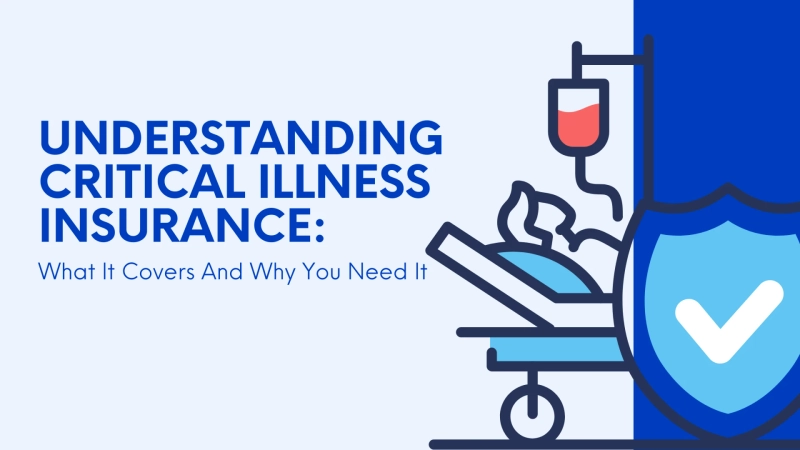Life can be wonderfully unpredictable—but serious health challenges can happen when we least expect them. While we all hope for continued good health, a critical illness such as cancer, heart attack, or stroke can strike at any age and cause not only emotional distress but also immense financial strain.
That’s where critical illness insurance comes in. In Thailand, this type of policy offers financial security when a major health event threatens to derail your well-being and finances. This article will help you understand how critical illness insurance works, what conditions it typically covers, and why it’s an essential layer of protection for individuals and families.
What Is Critical Illness Insurance?
Critical illness insurance provides a one-time lump sum payment when you're diagnosed with a covered severe illness. Unlike standard health insurance—which reimburses hospitals or medical professionals for services—critical illness insurance pays the money directly to you, giving you the flexibility to manage your recovery however you see fit.
Here's the difference:
- Health Insurance: Pays for hospital bills and treatments directly.
- Critical Illness Insurance: Pays you cash. You choose how to use it—whether for treatment, recovery, or daily living expenses.
In Thailand, the lump sum payout is usually tax-free, but always consult with a certified tax adviser for the latest regulations.
What Critical Illness Insurance Typically Covers
Each policy can vary, but most plans in Thailand cover conditions such as:
- Cancer (except non-invasive or early-stage unless included)
- Heart attack (myocardial infarction with confirmed diagnosis)
- Stroke (leading to lasting neurological impairment)
- Kidney failure (requiring dialysis or transplant)
- Major organ transplant
- Coronary artery bypass surgery
- Blindness, deafness, or paralysis
- Advanced-stage illnesses or loss of bodily functions
Important Details to Check:
- Waiting Period: Most plans in Thailand have a 30–90 day waiting period after your policy starts.
- Survival Period: You must survive a certain number of days (e.g., 14 or 30) post-diagnosis for the benefit to be paid.
- Policy Definitions: Always read the exact medical definitions, which can affect eligibility.
- Exclusions: Pre-existing conditions and early-stage illnesses are typically not covered unless otherwise stated.
Why Critical Illness Insurance Is Essential in Thailand
Even if you already have a good health plan or company HMO, you should still consider critical illness insurance. Here's why:
- Income Replacement: You may be unable to work for months. This benefit replaces lost income while you focus on recovery.
- Covers Non-Medical Costs: Unlike health insurance, this payout can cover travel for treatment, home care, therapy, or even rent and groceries.
- Protects Your Savings: It prevents you from using up your emergency fund or retirement savings.
- Flexible Use: You have complete control over how to spend the money—on treatment, family needs, or personal support.
- Rising Medical Costs in Thailand: As private healthcare improves, treatment costs rise. This insurance fills the financial gap.
- Better Outcomes, Longer Recovery: Modern medicine allows more people to survive, but recovery is often long—and costly.
How to Choose the Right Critical Illness Plan in Thailand
When reviewing available plans from providers keep these factors in mind:
- Coverage Amount: Choose an amount that covers your income loss, loans, and recovery costs.
- List of Covered Illnesses: Does it include early-stage cancer? How many illnesses are covered?
- Premium Cost: Consider your monthly budget and age.
- Waiting/Survival Periods: Confirm exact timelines before benefits are paid out.
- Riders/Add-ons: Some policies offer partial payouts for early-stage illnesses or recurring conditions.
- Reputation of the Insurer: Check their claim settlement ratio and approval time with Thailand’s Office of Insurance Commission (OIC).
Conclusion
Critical illness insurance is not just about preparing for the worst—it’s about protecting your quality of life when health challenges arise. The lump sum payout gives you flexibility, stability, and peace of mind when you need it most.
Secure Your Health and Financial Stability
Start preparing today. Visit www.allianz.co.th to explore critical illness plans designed for the needs of individuals and families in Thailand.
Frequently Asked Questions (Thailand Edition)
1. How much critical illness insurance do I need?
Calculate your monthly expenses, income gap during recovery, and any loan obligations. A minimum of 6–12 months' worth of income is a good benchmark.
2. Can I claim from more than one provider in Thailand?
Yes, you may hold multiple critical illness policies. You can claim separately from each as long as they cover the same illness.
3. Is the payout taxable in Thailand?
Generally, lump sum payouts from personal critical illness policies are not taxed, but it's best to confirm with a Thai tax advisor.
4. Can I get covered if I already have a health condition?
Insurers typically exclude pre-existing conditions. However, some may offer plans after review or with exclusions.
5. Is it available as a rider to life or VUL policies in Thailand?
Yes, many life or investment-linked policies offer a critical illness rider, which can be more affordable than a standalone plan.



